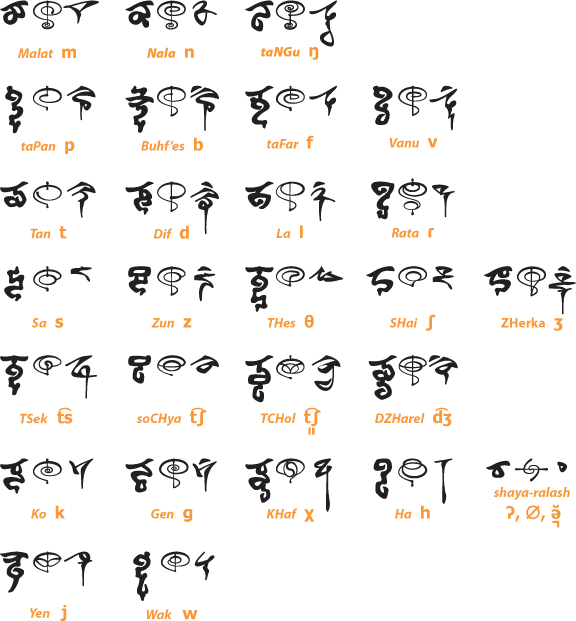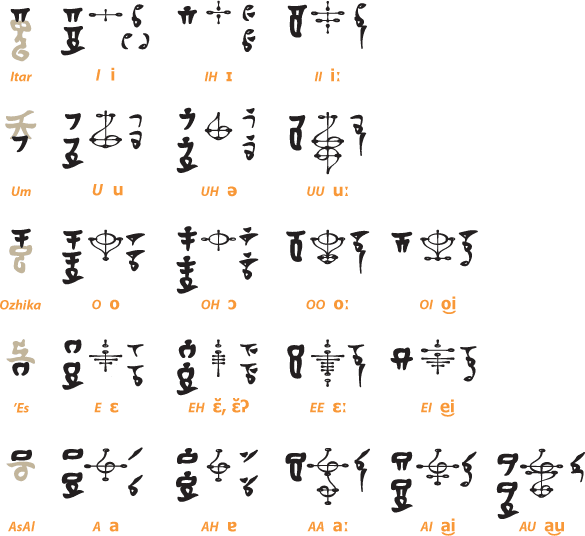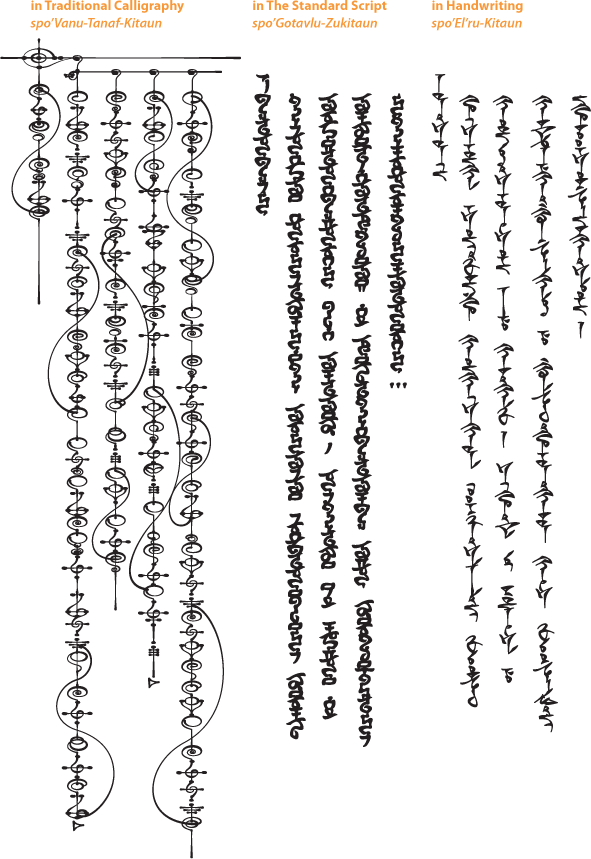Golic Vulcan is one of the constructed languages of the Vulcan race from the science fiction series Star Trek. It was carefully crafted over many years by Mark R. Gardner and other collaborators in the Vulcan Language Institute, which has been defunct since the latter half of 2008.
The core features of the language including the phonology, syntax and the basis for the morphology are creative extrapolations from the Vulcan language dialog heard in the feature films. As of June of 2011, the language has no official relationship to the Star Trek franchise but used in fan-fiction and other artistic projects.
Like the language itself, the 3 non-Roman writing systems presented here were inspired by Vulcan writing-related imagery that has appeared over the entire history of the series on screen. Specifically, the script referred to as Traditional Calligraphy is inspired by the graphic design of Michael Okuda. The Standard Script derives from the costume work by Robert Fletcher. All of the work to turn this visual imagery into functional alphabets has been done by Britton Watkins of korsaya.org.
In the following table the Standard Script (Gotavlu-zukitaun) letters appear to the left of the Traditional Calligraphy (Vanu-tanaf-kitaun) letters (nuhm) and the Handwriting (El’ru-Kitaun) variations appear in turn at the right in each cluster. The traditional name of the Standard Script letter is given along with the IPA for each sound. Note that for the Traditional and Handwriting scripts it is most common to simply refer to the consonants as C+/o/, hence "M" is "Mo". "N" is "No", etc. Exceptions occur for "oNG" and the consonant clusters "KSo" vs. "oKS" ("X"). The names in ‘o’ are omitted in the table for the sake of visual simplicity. The traditional names represent the fact that these letters are in most cases unmodified logographic glyphs from a more ancient system. Compare the historic usage of Egyptian hieroglyphs to write proper names or the manyo-gana of pre-syllabary Japanese.



A recording of this text by Britton Watkins
All sentient populace of the universe are born free and equal with respect to
dignity and rights. They are capable of possessing logic and ethical principles
and should act each toward the other in a manner of universal equality.
(A version of Article 1 of the Universal Declaration of Human Rights)
Information about the Vulcan language and scripts
http://memory-alpha.wikia.com/wiki/Vulcan_language
http://surak.nu/golic.php
https://www.pinterest.co.uk/pin/46865652346140592/?lp=true
http://korsaya.org/standard-vulcan-script-%E2%80%A2-gotavlu-zukitaun/
http://korsaya.org/writing-%e2%80%a2-pa%e2%80%99kitaun/
Vulcan Language Institute
http://www.vli-online.org/vlif.htm
Vulcan Language Dictionary (VLD)
http://www.starbase-10.de/vld/
Vulcan fonts
https://fontmeme.com/fonts/vulcan-script-font/
Constructed scripts for: Ainu | Arabic | Chinese languages | Dutch | English | Hawaiian | Hungarian | Japanese | Korean | Lingala | Malay & Indonesian | Persian | Tagalog / Filipino | Russian | Sanskrit | Spanish | Taino | Turkish | Vietnamese | Welsh | Other natural languages | Colour-based scripts | Tactile scripts | Phonetic/universal scripts | Constructed scripts for constructed languages | Adaptations of existing alphabets | Fictional alphabets | Magical alphabets | A-Z index | How to submit a constructed script
[top]
You can support this site by Buying Me A Coffee, and if you like what you see on this page, you can use the buttons below to share it with people you know.

If you like this site and find it useful, you can support it by making a donation via PayPal or Patreon, or by contributing in other ways. Omniglot is how I make my living.
Note: all links on this site to Amazon.com, Amazon.co.uk
and Amazon.fr
are affiliate links. This means I earn a commission if you click on any of them and buy something. So by clicking on these links you can help to support this site.
[top]